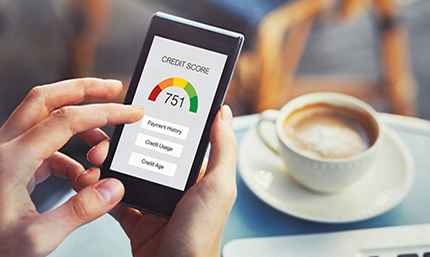News & Tips
Definitive Guide to Student Credit Cards

High school teenagers can start practicing financial responsibility and get a head start on building a positive credit history with their own credit card. While they typically wouldn’t qualify for a standard credit card because issuers require cardholders to be at least 18 or 21 years of age, Space Coast Credit Union (SCCU) offers one specifically for people aged 15-18: Visa® Student Credit Card.
Here’s more information about how teenagers can get on the road to financial independence and understand the role of credit in their lives. We’ll also share details about how our student credit cards work and how they can benefit your family.
Financial Responsibility and Independence
From allowances to part-time jobs, teens usually learn to become more financially responsible and independent by earning their own income. As teens earn money, parents or guardians can demonstrate how to use it responsibly by being a good role model for them and teaching them some of the following methods:
- Showing them the importance of saving money in an emergency savings account vs. depending on a credit card when unexpected expenses or opportunities arise.
- Introducing them to a credit union like SCCU and how it’s different from a bank. For example, low or no fees and better rates.
- Discussing their expenses and helping them to determine how much they should save out of each paycheck.
- Guiding them to make their own independent financial decisions by using resources, such as budgeting calculators, insights into creating a workable budget, a budgeting template, and more.
- If charitable giving is important to your family, you could invite your teen to contribute towards causes that matter in ways that fit their income and budget—and encourage them to also earmark some funds towards their upcoming college wants and needs.
Before a teen gets a credit card, it’s a good idea to have a conversation with them about responsible usage. For example, they should understand their personal budget and use the credit card within their own means. This concept will be useful for them now and in the future as they seek to buy a car, get their own place to rent or a mortgage, and so forth.
Educating Teens About Credit Scores
With a student credit card, teens can start building a credit score. A good credit score can help them get a lower deposit on an apartment and better rates on future loans. At a high level, these three-digit scores are a snapshot into a credit history, which includes debts and balances, how timely payments are made, and more.
Banks, credit unions, and so forth will report information on these topics to credit bureaus, such as Equifax, Experian, and TransUnion, for use on a person’s credit report. Then, these credit bureaus use this information to calculate a person’s credit score.
Different credit bureaus have different credit scores, with each of them having multiple scores that can be used for different purposes. Explaining how these scores are calculated can help your teen understand the importance of controlling their spending, paying credit card bills on time, and building their credit scores with care.
Here’s an overview of the calculation that goes into FICO Scores, a commonly used credit score lenders use to make approval decisions:
- Payment history (35%): This is the most important factor when building and maintaining quality credit scores. Conversely, missed or late payments can damage a score.
- Amount owed (30%): If your teen looks at the amount they owe on their student credit card and divides it by the credit limit, this creates an important percentage: the credit utilization score. Ideally, this will stay at less than 30%. When it is, this can help to build a good credit report and score.
- Credit history length (15%): As a teen just starting to build their credit, they won’t yet have a lengthy credit history. But, it’s important for your teen to have this information because it illustrates why it can make sense to keep a credit card open even when it doesn’t have a balance.
- Credit mix (10%): Having a revolving line of credit, such as a student credit card, and also an installment loan (a car or student loan) can help to boost credit scores.
- New credit (10%): Applying for multiple credit cards at once, as one example, can hurt a credit score—particularly when the person is still building their credit history.
Learn more about credit scores here.
Educating Teens about Student Credit Cards
Imagine your teen in the future as a young adult, getting their first credit card and quickly getting in over their head in debt because they did not have any prior knowledge of responsible usage.
On the other hand, maybe as a young adult, they don’t meet the qualifications to get a credit card, which then causes a delay in building good credit, and in turn, they have to spend more money on apartment deposits, insurance, and loans.
To solve this challenge, financial institutions like SCCU have created student credit cards. They have guardrails in place, such as using a savings account as collateral and requiring a legal guardian as a co-signer, so the Visa® Student credit card can be a helpful way for your teen to build credit and gain a sense of financial responsibility and independence.
Instead of credit card usage and terminology feeling so foreign, they can learn about statements, credit limits, and balances in practice under your supervision. For example, you can drill the importance of not going over the credit limit and paying the entire balance on time rather than just a minimum payment to avoid accruing interest and building credit.
Choosing the Best Credit Card
With student credit cards—just like with any other type of credit card—it’s a good idea to check all the credit card’s features and fine print. Then, apply for one that’s best suited for your particular situation.
Here are key credit card factors to consider (in alphabetical order!) along with how they work with SCCU’s Visa® Student Credit Card.
Age Limit
In general, SCCU requires credit card holders to be a minimum of 18 years old, but our student credit card is for ages 15-17.
Annual Fee
This is the amount charged annually to maintain the credit card. You can think about the annual fee as a membership fee to benefit from the card’s usage. At SCCU, we don’t charge annual fees for our student credit cards or any other credit cards we offer.
Applicants
These are the people that apply for a credit card. With our Visa® Student credit card, both the student and a parent/guardian apply. The parent or guardian will serve as the co-signer, and typically, they will need to have a savings account deposit that will serve as collateral.
APR* (Annual Percentage Rate)
This stands for annual percentage rate, which is the amount of interest paid on balances not paid in full within your billing cycle. In other words, you don’t pay interest charges on your credit card if, each month, you pay off the balance in full, but you will on any outstanding balances. You can see the as low as rate for APR* for purchases, balance transfers, and cash advances here.
Balance Transfers
When you transfer balances from one account to another—perhaps to lower your interest rates and APR* or to consolidate debt—those are balance transfers. SCCU does not charge a balance transfer fee.
Cash Advance
Cardholders who need cash can get it through a cash advance on their credit card. Although, many times, there are fees associated with cash advances and a higher APR*, SCCU does not charge a fee or a higher interest rate on cash advances versus purchases.
Collateral
In the financial context, collateral is an asset that a borrower uses to guarantee that an outstanding balance will be paid. In the case of our student credit cards, the parent or guardian who serves as co-signer may need to have a savings account at SCCU to serve as collateral.
Credit Card Issuer
After you apply for a credit card and receive approval, the credit card issuer provides you with the account and will supply credit-related information to the credit bureaus. This plays a key role in the building of a person’s credit.
Foreign/International Transaction Fee
When the credit card is used in a foreign county, it’s typical for the issuer to charge a fee: usually 1-3%. At SCCU, we charge the lowest of these: 1% (subject to change).
Late Payment Fee
Each month, at least the minimum required payment must be made on time. When this doesn’t happen, an additional fee can be charged for the lateness besides any impact the late payment will have on credit scores. At SCCU, late fees can go up to $27.00 (subject to change).
Minimum Payment
The minimum payment is the smallest amount that must be paid towards the balance to avoid late payments or other penalties and remain in good standing.
Payment Processor
Companies such as Visa®, Mastercard®, and Discover® are payment processors that connect the card issuer (such as SCCU) and the merchant where purchases are made. Each time that you use the credit card, the processor reviews the request, places the charges made on your credit card account, and pays the merchant.
Variable Interest Rate and APR*
When a credit card has a variable interest rate and APR*, the rate can change throughout the year according to your agreement and upon the credit card issuer providing you with notice. SCCU’s card comes with low variable rates.
Overall, it’s a good idea for teens to read the fine print before agreeing to any type of loan or credit card. This is a lesson that can serve them well throughout their life. Besides giving them a fuller understanding of the terms and conditions they’re agreeing to, it will help them choose products that best fit their needs and goals.
Features of SCCU’s Visa® Student Credit Card
SCCU Visa® Student Credit Cards feature a variety of fraud prevention and payment benefits.
- Free 2Way Text Fraud Alerts
- Contactless payments
- Effortlessly Manage Cards in Online & Mobile Banking
- Roadside assistance
- Visa® Account Updater (auto update your card information with participating merchants)
- Visa® Zero Liability Protection14
- Digital wallet payment options
Teens can apply for a Visa® Student Credit Card here online with a parent or guardian to take the first step toward financial independence today!
Credit Cards for Low Credit Borrowers
SCCU’s Visa® Student credit cards are for teens ages 15-17, but what about college students and anyone else looking to build their credit? We also offer Visa® Secured credit cards for adults with a low credit score, including college students, who are trying to establish or improve their credit.
A secured credit card uses another account, such as a savings account, as collateral against purchases made on the card. And not to worry, to merchants, this card will look and operate like a typical credit card. Then, after a year of good payment history, you can apply for SCCU’s Visa® Low Rate credit card.
Benefits of Choosing a Credit Union
When you and your family choose a credit union for your financial products and services, you benefit in a crucial way: financial wellness, the very heart of credit unions. They make decisions to benefit their members because, as a not-for-profit cooperative, what’s best for individual members is also right for the credit union as a whole.
The interest rates and fees at credit unions are typically lower than those at banks—and savings products tend to have higher interest rates. The ultimate goal of these products is to allow members to have better financial health and save more money.
Credit unions in Florida, like ones around the country, usually serve people who work in certain professions or live in designated geographies. You can become a member of SCCU as long as you live or work in any of our service counties and deposit $5 in a Share Savings account.
Deposits are insured through the National Credit Union Administration (NCUA). The NCUA provides protections in ways that are similar to FDIC’s coverage at traditional banks.
SCCU Watches Out for Your Family’s Interests
Teenagers should be able to have a student credit card from a financial institution that has their best interests at heart. As a credit union, we’re committed to looking out for our members’ interests and delivering this promise at SCCU: Honest People. Trusted Products. Time Valued. We also offer Student Checking accounts and Youth Savings accounts. Feel free to get in touch with us today with any questions.






















































